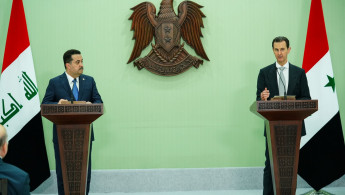Iraqi authorities deport three Kurdish refugees to Syria
Iraqi authorities, on Saturday, reportedly deported three Syrian Kurdish refugees to Syria after they were arrested on residency issues, disregarding concerns about their safety in their home country.
The step coincides with a formal visit by Iraqi Prime Minister Mohammed Shia al-Sudani to Syria on Sunday, in which he met with Syrian President Bashar al-Assad and discussed activating security and intelligence cooperation between Baghdad and Damascus.
The three Syrians, originally from Northeast Syria, were transferred to the Syrian intelligence from Baghdad International Airport on a flight to Damascus International Airport, an official from the Iraqi interior ministry in Baghdad has told The New Arab's Arabic sister site Al-Araby Al-Jadeed.
There are nearly thirty other Syrians arrested in Baghdad, who might be extradited to the Syrian authorities as well, an official, who refused to be named, also told the outlet. Families of the three Kurds remain in Baghdad, and they do not know what will be the fate of the deported men.
"The extradition of the Syrians is a dangerous step, the three Kurdish youths have got guardianship from the UN, and their refugee cases were pending for relocation in a third country," Jalal Brifkani, a political activist from Duhok province in the Iraqi Kurdistan region told al-Araby Al-Jadeed. "The step came within a security agreement between Iraq and the Syrian regime; lives of those Syrians are under threat after extraditing to the Syrian authorities."
As per the principles of the 1951 Refugee Convention, supplemented by its 1967 Protocol, refugees should not be returned to a country where they face severe threats to their life or freedom. But Iraq is not yet a signatory to the convention.
The Iraqi authorities arrested the three Syrian Kurds - Qahraman Ako Ali, Faisal Ako Ali, and Ali Zakaria Khalil- in March. Rashid Ali Jan, head of Jani Roj Charity Organization, has told Rudaw outlet. He asked the United Nations High Commissioner for Refugees (UNHCR) to intervene to stop extraditing nearly thirty other Syrian Kurds by the Iraqi government to the Syrian regime, as the extradition is considered abusing human rights.
TNA contacted Firas Al-Khateeb, the spokesperson of the UNHCR in Iraq, as well as officials in the United Nations Assistance Mission for Iraq (UNAMI), but they were not immediately available to comment.
Mohammed Ramada is among those arrested in Baghdad, and his wife is an Iraqi, Jan confirmed to the outlet.
According to the Iraqi nationality law, any foreigner married to an Iraqi can ask for Iraqi nationality after five years of marriage.
Arab foreign ministers in May met in Amman and agreed that "The voluntary and safe return" of Syrian refugees to their country "is a top priority".
According to the United Nations, about 5.5 million Syrian refugees who fled since the conflict began in 2011 are registered in Lebanon, Jordan, Turkey, Iraq and Egypt.
Syria's civil war began in 2011 after regime forces violently suppressed mass protests. Hundreds of thousands of Syrians have been killed, mainly due to the bombardment of civilian areas by Bashar al-Assad's regime and its ally Russia.





 Follow the Middle East's top stories in English at The New Arab on Google News
Follow the Middle East's top stories in English at The New Arab on Google News
![Netanyahu furiously denounced the ICC [Getty]](/sites/default/files/styles/image_330x185/public/2024-11/GettyImages-2169352575.jpg?h=199d8c1f&itok=-vRiruf5)
![Both Hamas and the Palestinian Authority welcomed the ICC arrest warrants [Getty]](/sites/default/files/styles/image_330x185/public/2024-11/GettyImages-2178351173.jpg?h=199d8c1f&itok=TV858iVg)
